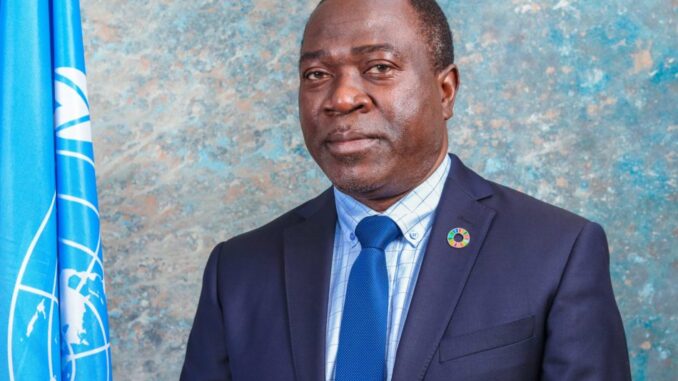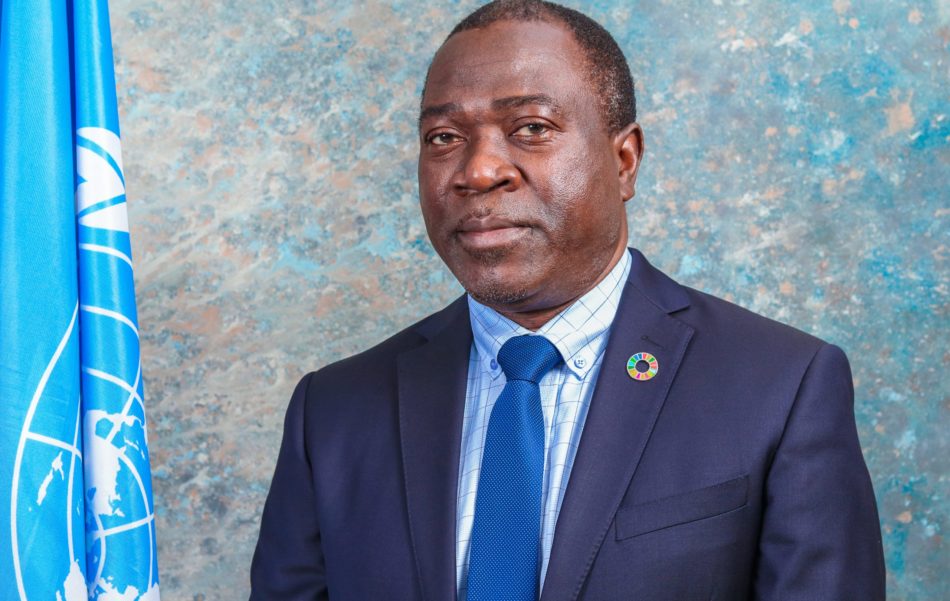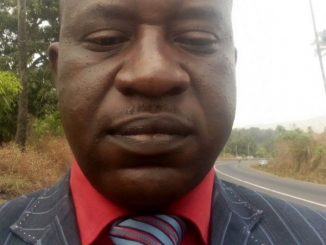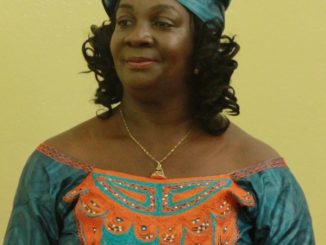
UN Calls for Transparency and Constructive Engagement Around Constitutional Review Process in Sierra Leone
The United Nations Resident Coordinator in Sierra Leone, Mr. Babatunde Ahonsi, has called on the Government of Sierra Leone to ensure transparency and constructive engagement around the Constitutional review process in Sierra Leone, especially with political parties, to build momentum and consensus on proposed legal reforms.
Mr. Ahonsi was speaking on behalf of International Development Partners during the launch of the Government White Paper on the Constitutional Review Process on 13 January 2022 at State House Conference Hall, Tower Hill, Freetown. He said this is key in the constitutional review process following the launching of the White Paper.

“The constitutional review process is an opportunity to strengthen human rights protection in the country, and to make real progress on electoral reforms. Building on today’s historic event with a broad and meaningful process of consultation would help to foster inclusive political dialogue, trust-building and fruitful political engagement,” said Mr. Ahonsi, adding that the occasion is an important event for the future of the country and its democratic consolidation, peacebuilding and state-building processes.
He said the Government’s White Paper represents the conclusion of the initial phase of the constitutional review process and the opening of a new stage of the process.
“Today’s launch is a fulfilment of the pledge made by Sierra Leone during the Universal Periodic Review on Human Rights in May 2021 that it will finalize the Constitutional Review Process,” said Mr. Ahonsi.
The constitutional review was first agreed upon at the 1999 Lome Peace Accord between all stakeholders. Subsequently, in 2002, the True and Reconciliation Commission recommended the revision of the Constitution through a “wide and thorough consultative and participatory process” that “must lay the foundations for a democratic and open society in which every citizen is equally protected by the law”.
In 2007, the Sierra Leone People’s Party (SLPP) government initiated the first constitutional review process and created a commission led by Dr. Peter Tucker. The process ended in 2008 with the submission of the final report to late President Ahmad Tejan Kabba. The Constitutional review process restarted in 2013 under former President Koroma, who established an 80-member committee, led by late Justice Edmond Cowan, to review both the 1991 Constitution and Dr. Peter Tucker’s report.
The Constitutional Review Committee (CRC) operated from 2013 to 2017, with the technical and financial support of the United Nations Development Programme (UNDP), UN Women, the United Kingdom, European Union, Ministries of Foreign Affairs of Kenya and Ghana. The support of our development partners was instrumental to ensure a wide consultative process that collected opinions and views of all categories of citizens. During its mandate, the CRC carried out a series of inclusive civic education activities, stakeholder consultations, consultative dialogues, workshops and expert meetings. These included:
– 10,000 public consultations with various stakeholders nationwide;
– 133 stakeholder engagements held with Women, Youth, Political Parties; Paramount Chiefs, Local Councillors, CSOs, Media and Lawyers;
– 198 Ministries Departments and Agencies, Commissions, Religious groups, Relevant Institutions consulted;
– 80 Experts engagements on key constitutional issues;
– 150 Position Papers submitted to the CRC by CSOs; MDAs; Political Parties; Women Groups; NCPC; Media Practitioners, Lawyers, Youth, Tribal Heads etc.
– 20,000 hours of airtime over the Sierra Leone Broadcasting Corporation (SLBC) and other radio stations for the sensitization programmes that included live debates, theme songs, jingles, and spot messages, among others.
– About 70,000 forms for individuals and institutions were distributed.
Civil Society Organizations’ engagement in the review process was also remarkable. Civil
Society Organizations, comprising WANEP, OXFAM, NCD, SDI/CCC and CGG provided support to raise awareness among the public about the Constitutional review process, which improved public contribution and participation.
CRC’s website, Newsletter, Twitter, WhatsApp, YouTube and Facebook pages generated a great level of information and widely contributed to the review process. 40,960 website visitors and 5,211 followers and likes on CRC’s Facebook page were registered.
All thematic issues of the 1991 Constitution relating to Executive, Legislative, Judiciary, Information and Communication, Fundamental principles of State Policy and Human Rights, citizenship, local government and Natural Resources were thoroughly debated upon.
The report that resulted from what Mr. Ahonsi described as a ‘remarkably inclusive effort’, was delivered by late Justice Cowman to former President Koroma on 24 January 2017. A Government White Paper was, subsequently, released on 10 November 2017, which rejected about 100 recommendations of the CRC report out of 134.
According to the UN Resident Coordinator, the launch of the White Paper opens a new phase of the review process, as a debate will have to take place in Parliament, a new Constitution will have to be drafted and laws of the country will have to be reviewed, accordingly. Some of the provisions, he continued, might also require a referendum, and the drafting of the new Constitution will have to take into account the international treaties and conventions signed and ratified by the country.
Furthermore, Mr. Ahonisi said citizens will have to be educated along this process, as well and hopes that the White Paper being launched reflects the contributions, aspirations and determination of the people of Sierra Leone to improve and sustain the rule of law, lasting peace, and human development.
Meanwhile, Mr. Ahonsi commended the positive steps already taken by President Julius Maada Bio and his Government in advancing several reforms and laws that are part of the recommendations of the Constitutional review process, such as:
– the reforms in the Media sector, chiefly the repeal of the provisions on the criminal libel, which had frequently infringed on the right to freedom of speech;
– the abolition of the death penalty and amendment of legislation;
– the land reforms;
– the ongoing decentralization process;
– the free quality education programme and rights of pregnant girls to education;
– the citizenship reform;
– the amendment of the Anti-Corruption Commission Act, among others.
Other reforms also related to the recommendations of the Constitutional Review process, he said, are at an advanced stage of discussion with the participation of relevant stakeholders, such as the Gender Empowerment Bill, the new Political Parties Registration Commission Act, some electoral reforms, including the fixed date for the general elections, among others.
In addition, Mr. Ahonsi said the constitutional amendments proposed during the review process are also relevant for the realization of the Sustainable Development Goals (SDGs). The current SDG Decade of Action prioritises solutions that catalyze simultaneous progress on multiple SDGs, including on social and economic development and poverty reduction (SDGs 1-4, 7-11), gender equality and women’s empowerment (SDG 5), reducing inequality (SDG 10), environmental protection (SDGs 6, 12-15) and fostering peaceful, just and inclusive societies (SDG 16).
“The drafting of the new Constitution will be a major endeavour. The UN System here in Sierra Leone in collaboration with other development partners, stands ready to support with requisite capacities, ensuring that the process is broadly consultative and fruitful while leaving no one behind,” said Mr. Ahonsi, while wishing Sierra Leone all-round progress in 2022.
Ticha Lemp Lemp | Friday 21st January 2022 | Rule of Law | Pages 6 & 7
UN Calls for Transparency and Constructive Engagement Around Constitutional Review Process in Sierra Leone
The United Nations Resident Coordinator in Sierra Leone, Mr. Babatunde Ahonsi, has called on the Government of Sierra Leone to ensure transparency and constructive engagement around the Constitutional review process in Sierra Leone, especially with political parties, to build momentum and consensus on proposed legal reforms.
Mr. Ahonsi was speaking on behalf of International Development Partners during the launch of the Government White Paper on the Constitutional Review Process on 13 January 2022 at State House Conference Hall, Tower Hill, Freetown. He said this is key in the constitutional review process following the launching of the White Paper.
“The constitutional review process is an opportunity to strengthen human rights protection in the country, and to make real progress on electoral reforms. Building on today’s historic event with a broad and meaningful process of consultation would help to foster inclusive political dialogue, trust-building and fruitful political engagement,” said Mr. Ahonsi, adding that the occasion is an important event for the future of the country and its democratic consolidation, peacebuilding and state-building processes.
He said the Government’s White Paper represents the conclusion of the initial phase of the constitutional review process and the opening of a new stage of the process.
“Today’s launch is a fulfilment of the pledge made by Sierra Leone during the Universal Periodic Review on Human Rights in May 2021 that it will finalize the Constitutional Review Process,” said Mr. Ahonsi.
The constitutional review was first agreed upon at the 1999 Lome Peace Accord between all stakeholders. Subsequently, in 2002, the True and Reconciliation Commission recommended the revision of the Constitution through a “wide and thorough consultative and participatory process” that “must lay the foundations for a democratic and open society in which every citizen is equally protected by the law”.
In 2007, the Sierra Leone People’s Party (SLPP) government initiated the first constitutional review process and created a commission led by Dr. Peter Tucker. The process ended in 2008 with the submission of the final report to late President Ahmad Tejan Kabba. The Constitutional review process restarted in 2013 under former President Koroma, who established an 80-member committee, led by late Justice Edmond Cowan, to review both the 1991 Constitution and Dr. Peter Tucker’s report.
The Constitutional Review Committee (CRC) operated from 2013 to 2017, with the technical and financial support of the United Nations Development Programme (UNDP), UN Women, the United Kingdom, European Union, Ministries of Foreign Affairs of Kenya and Ghana. The support of our development partners was instrumental to ensure a wide consultative process that collected opinions and views of all categories of citizens. During its mandate, the CRC carried out a series of inclusive civic education activities, stakeholder consultations, consultative dialogues, workshops and expert meetings. These included:
– 10,000 public consultations with various stakeholders nationwide;
– 133 stakeholder engagements held with Women, Youth, Political Parties; Paramount Chiefs, Local Councillors, CSOs, Media and Lawyers;
– 198 Ministries Departments and Agencies, Commissions, Religious groups, Relevant Institutions consulted;
– 80 Experts engagements on key constitutional issues;
– 150 Position Papers submitted to the CRC by CSOs; MDAs; Political Parties; Women Groups; NCPC; Media Practitioners, Lawyers, Youth, Tribal Heads etc.
– 20,000 hours of airtime over the Sierra Leone Broadcasting Corporation (SLBC) and other radio stations for the sensitization programmes that included live debates, theme songs, jingles, and spot messages, among others.
– About 70,000 forms for individuals and institutions were distributed.
Civil Society Organizations’ engagement in the review process was also remarkable. Civil Society Organizations, comprising WANEP, OXFAM, NCD, SDI/CCC and CGG provided support to raise awareness among the public about the Constitutional review process, which improved public contribution and participation.
CRC’s website, Newsletter, Twitter, WhatsApp, YouTube and Facebook pages generated a great level of information and widely contributed to the review process. 40,960 website visitors and 5,211 followers and likes on CRC’s Facebook page were registered.
All thematic issues of the 1991 Constitution relating to Executive, Legislative, Judiciary, Information and Communication, Fundamental principles of State Policy and Human Rights, citizenship, local government and Natural Resources were thoroughly debated upon.
The report that resulted from what Mr. Ahonsi described as a ‘remarkably inclusive effort’, was delivered by late Justice Cowman to former President Koroma on 24 January 2017. A Government White Paper was, subsequently, released on 10 November 2017, which rejected about 100 recommendations of the CRC report out of 134.
According to the UN Resident Coordinator, the launch of the White Paper opens a new phase of the review process, as a debate will have to take place in Parliament, a new Constitution will have to be drafted and laws of the country will have to be reviewed, accordingly. Some of the provisions, he continued, might also require a referendum, and the drafting of the new Constitution will have to take into account the international treaties and conventions signed and ratified by the country.
Furthermore, Mr. Ahonisi said citizens will have to be educated along this process, as well and hopes that the White Paper being launched reflects the contributions, aspirations and determination of the people of Sierra Leone to improve and sustain the rule of law, lasting peace, and human development.
Meanwhile, Mr. Ahonsi commended the positive steps already taken by President Julius Maada Bio and his Government in advancing several reforms and laws that are part of the recommendations of the Constitutional review process, such as:
– the reforms in the Media sector, chiefly the repeal of the provisions on the criminal libel, which had frequently infringed on the right to freedom of speech;
– the abolition of the death penalty and amendment of legislation;
– the land reforms;
– the ongoing decentralization process;
– the free quality education programme and rights of pregnant girls to education;
– the citizenship reform;
– the amendment of the Anti-Corruption Commission Act, among others.
Other reforms also related to the recommendations of the Constitutional Review process, he said, are at an advanced stage of discussion with the participation of relevant stakeholders, such as the Gender Empowerment Bill, the new Political Parties Registration Commission Act, some electoral reforms, including the fixed date for the general elections, among others.
In addition, Mr. Ahonsi said the constitutional amendments proposed during the review process are also relevant for the realization of the Sustainable Development Goals (SDGs). The current SDG Decade of Action prioritises solutions that catalyze simultaneous progress on multiple SDGs, including on social and economic development and poverty reduction (SDGs 1-4, 7-11), gender equality and women’s empowerment (SDG 5), reducing inequality (SDG 10), environmental protection (SDGs 6, 12-15) and fostering peaceful, just and inclusive societies (SDG 16).
“The drafting of the new Constitution will be a major endeavour. The UN System here in Sierra Leone in collaboration with other development partners, stands ready to support with requisite capacities, ensuring that the process is broadly consultative and fruitful while leaving no one behind,” said Mr. Ahonsi, while wishing Sierra Leone all-round progress in 2022.
Ticha Lemp Lemp | Friday 21st January 2022 | Rule of Law | Pages 6 & 7



